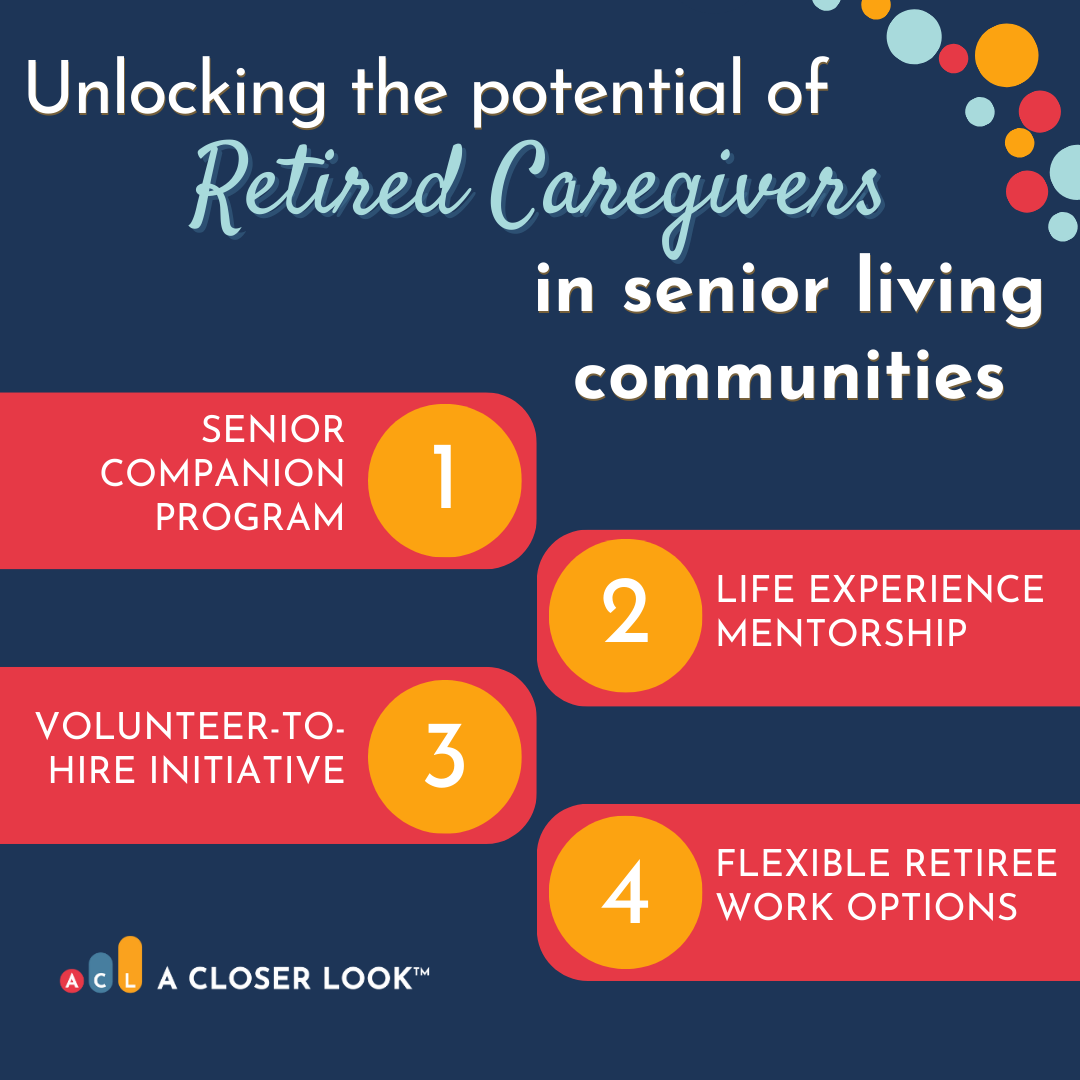
Unlocking the Potential of Retired Caregivers in Senior Living Communities
As the senior living industry grapples with a pressing challenge – a significant staffing gap caused by the shortage of caregivers – innovative solutions are urgently needed. 52% of assisted living providers say their overall workforce situation has deteriorated since the beginning of 2022. 63% are experiencing staffing shortages with a quarter of those providers saying they have a high level of staffing shortages. To confront these obstacles head-on, operators must go beyond conventional methods and explore new avenues to attract, hire, and retain skilled caregivers.
However, amidst this staffing crisis, there exists an untapped resource that holds tremendous promise: hiring retired individuals as caregivers. We’ve outlined four forward-thinking ideas that not only address the pressing staffing shortage but also foster a sense of purpose, engagement, and community involvement among both caregivers and residents.
By implementing these unique approaches, senior living communities can breathe new life into their workforce, reducing turnover, and creating a vibrant company culture that fosters diversity, loyalty and dedication among employees.
The Value of Retired Individuals As Caregivers
Experience matters, especially in the caregiving industry. Retirees bring a wealth of life experience, compassion, and empathy to their roles as caregivers. Their familiarity with the challenges of aging allows them to connect on a deeper level with elderly residents, understanding their needs and desires. This unique understanding fosters trust, respect, and meaningful relationships, creating a more nurturing and compassionate caregiving environment.
Benefits to Senior Living Communities
Beyond the intrinsic value of experience and empathy, the presence of retiree caregivers enhances the overall reputation of a senior living community. Families seek environments that promote a sense of home, where residents are treated with dignity and respect. The rapport developed between retiree caregivers and residents contributes significantly to a positive community reputation.
Addressing Potential Challenges
Adopting a strategy of hiring senior caregivers also improves company culture and employee morale, sending a message that there are no age-related stereotypes and biases. Communities can instead foster a culture of inclusivity by embracing the unique strengths that experienced individuals bring. Continuous training and professional development opportunities can also help keep retiree caregivers up-to-date with modern practices and technology.
Four Ways to Unlock the Potential of Hiring Retirees
1. Senior Companion Program
Create a senior companion program where older, recently retired individuals work as companions to residents, fostering meaningful connections and social engagement. This program capitalizes on the retirees’ desire for social interaction and offers a purposeful way to stay active and engaged in their community. To implement, develop a structured program with flexible hours, matching senior companions with residents based on shared interests and backgrounds.
2. Life Experience Mentorship
Establish a mentorship program where recently retired professionals volunteer to mentor and train staff, allowing retirees to share their expertise and experience in a supportive environment. This idea harnesses the wealth of knowledge from retirees while creating a sense of purpose and community engagement. Collaborate with local retiree organizations and offer incentives like flexible hours or continued learning opportunities for mentors.
3. Volunteer-to-hire Initiative
Implement a volunteer-to-hire initiative, allowing retirees to volunteer at the community and transition into paid roles if they choose. This program provides retirees with an opportunity to explore the industry before committing to a permanent position, promoting a smooth transition to rewarding work. Provide clear pathways for volunteers to express their interest in paid positions, and provide training for those transitioning to paid roles.
4. Flexible Work Options for Retirees
Offer flexible work arrangements tailored for retirees, allowing them to work part-time or on a seasonal basis. This approach acknowledges retirees’ desire for work-life balance and allows them to continue contributing to the industry while enjoying their retirement. Create job roles that suit retirees’ preferences and expertise, ensuring they have the freedom to choose their work schedule.
The shortage of caregivers in the senior living industry is a pressing concern that demands innovative solutions. Embracing the experience and dedication of senior, retired caregivers not only bridges the staffing gap but also breathes new life into senior living communities. By fostering an environment of inclusivity, purpose, and community involvement, decision-makers can lay the foundation for a thriving future in senior care. Smart senior living communities that embrace this forward-thinking approach will unlock the potential of a seasoned workforce and make a meaningful difference in the lives of the caregivers and the seniors they serve.